CYCLOPENTANECARBONITRILE
Synonym(s):Cyanocyclopentane;Cyclopentyl cyanide
- CAS NO.:4254-02-8
- Empirical Formula: C6H9N
- Molecular Weight: 95.14
- MDL number: MFCD00013741
- EINECS: 224-229-2
- SAFETY DATA SHEET (SDS)
- Update Date: 2023-04-23 13:52:06
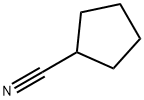
What is CYCLOPENTANECARBONITRILE?
Chemical properties
Clear colorless to faintly yellow liquid
The Uses of CYCLOPENTANECARBONITRILE
Cyclopentanecarbonitrile is used as a substrate and reagent to investigate the specific activity of nitrile and amide hydrolyzing enzymes isolated from candida guilliermondii cells. It is also used to prepare cyclopentanecarboxamide by using tetrabutylammonium hydrogen sulfate as a catalyst in the presence of reagents such as aqueous hydrogen peroxide and sodium hydroxide.
The Uses of CYCLOPENTANECARBONITRILE
Cyano substituted cyclopentane which can be converted into cyanohydrin glucosides by Passiflora morifolia and Turnera angustifolia.
General Description
Cyclopentanecarbonitrile is an alicyclic nitrile.
Purification Methods
Dissolve the nitrile in Et2O, wash it thoroughly with saturated aqueous K2CO3, dry (MgSO4) and distil it through a 10 cm Vigreux column (p 11). [McElvain & Stern J Am Chem Soc 77 457 1955, Bailey & Daly J Am Chem Soc 81 5397 1959, Beilstein 9 IV 14.]
Properties of CYCLOPENTANECARBONITRILE
| Melting point: | −76 °C(lit.) |
| Boiling point: | 67-68 °C10 mm Hg(lit.) |
| Density | 0.912 g/mL at 25 °C(lit.) |
| refractive index | n |
| Flash point: | 132 °F |
| solubility | Miscible with toluene. |
| form | clear liquid |
| color | Colorless to Almost colorless |
| BRN | 1098717 |
| Exposure limits | NIOSH: IDLH 25 mg/m3 |
| CAS DataBase Reference | 4254-02-8(CAS DataBase Reference) |
Safety information for CYCLOPENTANECARBONITRILE
| Signal word | Danger |
| Pictogram(s) |
 Flame Flammables GHS02  Skull and Crossbones Acute Toxicity GHS06 |
| GHS Hazard Statements |
H226:Flammable liquids H301:Acute toxicity,oral H315:Skin corrosion/irritation H319:Serious eye damage/eye irritation H335:Specific target organ toxicity, single exposure;Respiratory tract irritation |
| Precautionary Statement Codes |
P210:Keep away from heat/sparks/open flames/hot surfaces. — No smoking. P233:Keep container tightly closed. P240:Ground/bond container and receiving equipment. P301+P310:IF SWALLOWED: Immediately call a POISON CENTER or doctor/physician. P303+P361+P353:IF ON SKIN (or hair): Remove/Take off Immediately all contaminated clothing. Rinse SKIN with water/shower. P305+P351+P338:IF IN EYES: Rinse cautiously with water for several minutes. Remove contact lenses, if present and easy to do. Continuerinsing. |
Computed Descriptors for CYCLOPENTANECARBONITRILE
New Products
(S)-3-Aminobutanenitrile hydrochloride 4-Methylphenylacetic acid N-Boc-D-alaninol N-BOC-D/L-ALANINOL Tert-butyl bis(2-chloroethyl)carbamate 3-Morpholino-1-(4-nitrophenyl)-5,6-dihydropyridin- 2(1H)-one Furan-2,5-Dicarboxylic Acid Tropic acid 1-Bromo-3,5-Di-Tert-Butylbenzene S-2-CHLORO PROPIONIC ACID ETHYL ISOCYANOACETATE 2-Bromo-1,3-Bis(Dimethylamino)Trimethinium Hexafluorophosphate 4-IODO BENZOIC ACID 3-NITRO-2-METHYL ANILINE 1-(2,4-DICHLOROPHENYL) ETHANAMINE (2-Hydroxyphenyl)acetonitrile 4-Bromopyrazole 2-(Cyanocyclohexyl)acetic acid 4-methoxy-3,5-dinitropyridine 1-(4-(aminomethyl)benzyl)urea hydrochloride 2-aminopropyl benzoate hydrochloride diethyl 2-(2-((tertbutoxycarbonyl)amino) ethyl)malonate tert-butyl 4- (ureidomethyl)benzylcarbamate Ethyl-2-chloro((4-methoxyphenyl)hydrazono)acetateRelated products of tetrahydrofuran
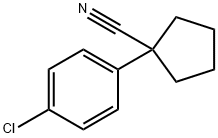
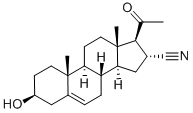

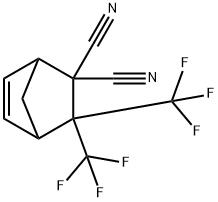


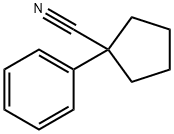

You may like
-
 Cyclopentanecarbonitrile CAS 4254-02-8View Details
Cyclopentanecarbonitrile CAS 4254-02-8View Details
4254-02-8 -
 Cyclopentanecarbonitrile 96% CAS 4254-02-8View Details
Cyclopentanecarbonitrile 96% CAS 4254-02-8View Details
4254-02-8 -
 CYCLOPENTANE CARBONITRILE CHEMICAL CAS 4254-02-8View Details
CYCLOPENTANE CARBONITRILE CHEMICAL CAS 4254-02-8View Details
4254-02-8 -
 Cyclopentanecarbonitrile CAS 4254-02-8View Details
Cyclopentanecarbonitrile CAS 4254-02-8View Details
4254-02-8 -
 1975-50-4 98%View Details
1975-50-4 98%View Details
1975-50-4 -
 2-HYDROXY BENZYL ALCOHOL 98%View Details
2-HYDROXY BENZYL ALCOHOL 98%View Details
90-01-7 -
 14714-50-2 (2-Hydroxyphenyl)acetonitrile 98+View Details
14714-50-2 (2-Hydroxyphenyl)acetonitrile 98+View Details
14714-50-2 -
 118753-70-1 98+View Details
118753-70-1 98+View Details
118753-70-1